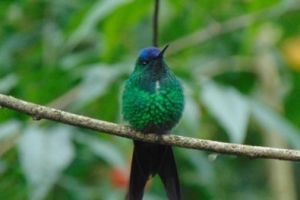By André Julião | Agência FAPESP – Scientists, public administrators and civil society organizations in São Paulo state will join forces in BIOTA Synthesis – the Center for Analysis and Synthesis of Nature-Based Solutions – for the next five years to develop nature-based solutions to socio-environmental problems such as floods, lack of pollinators for agriculture, and zoonoses (infectious diseases transmitted from animals to humans).

BIOTA Synthesis is hosted by the University of São Paulo’s Institute of Advanced Studies (IEA-USP). It is one of FAPESP’s Science for Development Centers (CCDs) and was officially launched in an online event held on May 18.
“This is an opportunity to combine good research with a return to society since we’re dealing with problems that have socio-environmental impacts and are therefore of matters of direct social interest,” said Jean Paul Metzger, a professor at the Institute of Biosciences (IB-USP) and head of the new center.
BIOTA Synthesis is a cluster of 27 institutions such as universities, state government departments and non-governmental organizations, and will focus on the challenges of sustainable agriculture, water security, and control of zoonoses.
“The Science for Development program establishes and supports research centers focusing on problems faced by São Paulo state, most of which require solutions of a multidisciplinary, albeit single-issue, nature. BIOTA Synthesis is a good example of its dynamics because it will focus on the interactions among the environment, health, agriculture and people,” said Marco Antonio Zago, President of FAPESP, in his opening address to the event.
According to Metzger, a member of the steering committee for the FAPESP Program for Research on Biodiversity Characterization, Conservation, Restoration and Sustainable Use (BIOTA-FAPESP), the new center will fill two major gaps, one of which is scientific and relates to data synthesis to provide evidence that supports public policies, while the other is a more practical matter of implementing this knowledge. “The idea is both to organize the science so that it becomes more useful and to think about the tools for implementation,” he said.
BIOTA Synthesis has a multidisciplinary team divided into areas of interest: agriculture and ecosystem services; restoration and forest-based economics; control of zoonoses; cities, health and adaptation; and co-production of public policy.
“The Department for Infrastructure & Environment has great expectations for the project. The research will be designed to improve public policy. We’re very pleased to be participating in the project and will be happy to do whatever it takes to ensure that its results are the best possible,” said Fernando Chucre, São Paulo State Secretary for Infrastructure & Environment.
Also involved in the project are the São Paulo State Departments of Health and Agriculture & Food Supply, the São Paulo City Department of Green Spaces & Environment, São Paulo State University (UNESP), the University of Campinas (UNICAMP), the Federal University of São Carlos (UFSCar) and the Federal University of the ABC (UFABC).
Public policy
For Guilherme Ary Plonski, Director of IEA-USP, BIOTA Synthesis is a breeding ground for new ideas and for different areas to coexist, interact and debate. “It’s a cluster of entities with varying backgrounds that have joined forces to address a cause that is mobilizing a large part of humanity: sustainability. We want to leave future generations a world that’s at least not worse than the one we received, but hopefully better,” he said.
Luís Fernando Guedes Pinto, Chief Knowledge Officer at Atlantic Rainforest protection NGO Fundação SOS Mata Atlântica, said the new center must engage with organized civil society from the word go and ensure that it focuses on public policy formulation based on the best available knowledge.
“Knowledge production is consistently ahead of public policy implementation. We need to close the gap between science and public policy,” he said. “The project is designed to strive to do this by seeking out questions in a participatory manner and having groups of high-level researchers develop solutions in answer to those questions.”
BIOTA Synthesis is already working with the São Paulo State Government on a climate action plan, which aims to restore 1.5 million hectares of forest by 2050, among other goals. The plan will be presented to the 2022 UN Climate Change Conference (COP27) to be held in Egypt in November.
A recording of the launch event can be watched at: youtu.be/ZJpMdZkzVxM.
